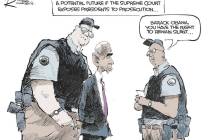Caught with their pants down
Standing on the sidelines, watching our 6-year-old sons play soccer in Virginia, my former husband developed a "man crush" on David Petraeus.
My ex is a Vietnam veteran, emotionally attached to the military and fascinated with Petraeus, the West Point graduate and Princeton Ph.D. who was then living in the D.C. area. He thought Petraeus was brilliant.
Two decades later, brilliant is not the first word that comes to mind when Petraeus' name is mentioned.
What's most mystifying about the scandal surrounding Petraeus' abrupt resignation from the CIA over an extramarital affair is that he was brought down by email. He and his mistress naively believed they could privately share a Gmail account where they'd leave love notes in the draft file - and never get caught.
(A trick terrorists have often used. Teenagers, too.)
Note to the general, and to former presidential candidate Mitt Romney, who thought he could confide to rich Florida donors that 47 percent of the country thinks they are entitled to a government handout. This is 2012. There is no such thing as privacy. It's gone. Forever. There are no secrets on the Internet. We all have tacitly traded privacy for endless Internet access and all the wonders it provides.
Federal agents easily discovered the cuckholding couple's emails. And after Mother Jones authenticated the audio from a Romney dinner party, the magazine posted it on the Internet for the rest of the world to hear.
Did Romney really think he could be so indiscrete in the heat of a tight, emotionally charged presidential campaign? Did he really think no one would pass that on?
Listen up and get used to it: We now live in a world where the microphone is always on, and everything you say can and will be used against you.
It's shocking, really, that incredibly smart, talented people don't know that - or think they can trick the system and carry on online, believing they are enveloped in a bubble of privacy.
They can't.
Just ask Nancy Sebring, the former superintendent of the Des Moines, Iowa, public school system. All appeared to be going well for her earlier this year. She had done such a good job in Des Moines that the Omaha school district - the largest in Nebraska - came calling. It offered her a job with a July 1 start date.
Her last day in Des Moines was to be June 30. But then out of the blue, on May 10, she abruptly and inexplicably resigned. A comment under the Des Moines Register's story said, "Something doesn't smell right about all of this."
The comment was right. Both the Register and the Omaha World-Herald filed public record requests to see her emails. The Register was concerned about a potential conflict of interest. The World-Herald believed some were lobbying Sebring before she even arrived.
Routine requests. But instead, the reporters hit pay dirt.
More than 600 emails, 40 of which were communiques between the married Sebring and her married military lover - and 25 percent were so sexually explicit the newspapers could not print them. She'd sent them on a district computer during the school day. Just plain dumb.
Sebring, 57, resigned minutes after she was confronted about the steamy emails. A smart woman brought down by the Internet. So was Rep. Anthony Weiner, D-N.Y., who sent out tweets of his erect penis in a pair of tighty whities. He resigned last year.
Let's not forget Rep. Christopher Lee, R-N.Y. He was forced to resign after the married congressman was caught sending emails to women on Craigslist.
And then there was Rep. Mark Foley, R-Fla. He resigned in 2008 after he was caught sending suggestive emails to underage boys serving as congressional pages.
Regardless of what you think about these sexual appetites, some false sense that they were operating in their own protected universe played a key role in their downfalls.
House Minority Leader Nancy Pelosi, D-Calif., best summed up our collective disbelief in a recent comment. "Why somebody would be personally indiscreet is their own problem," she said. "Why they would do it in emails is beyond my imagination."
Mine, too.
Alicia Shepard is a visiting professor at the University of Nevada, Las Vegas, teaching journalism. She is the author of "Woodward and Bernstein: Life in the Shadow of Watergate."























